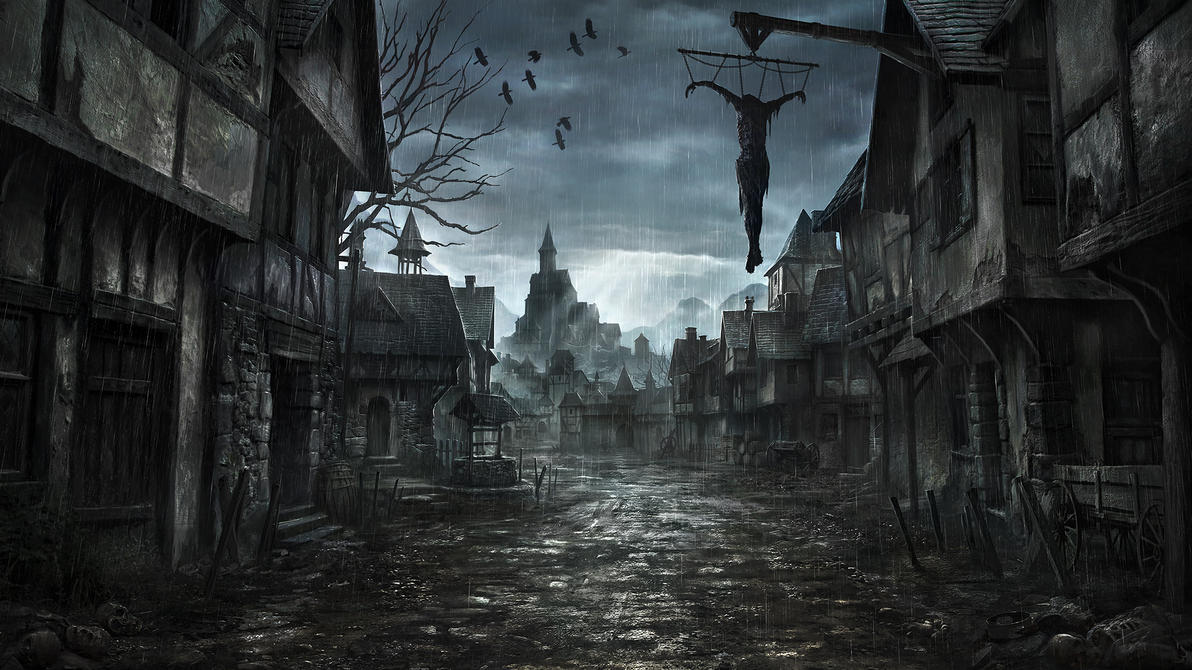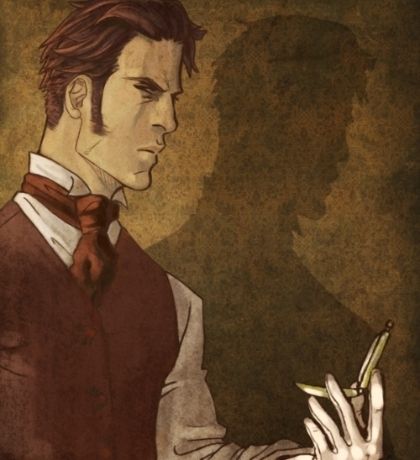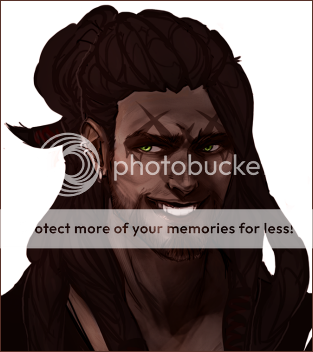Twilight was falling as Algernon made his way back, along with a fine rain whose dark, gravid cloud cover promised imminent downpour. The young solicitor had half a mind to turn for his fashionable little brownstone and celebrate the new contract with a few ample servings from the cask of
Ole Hammermasher's malt whisky his employer had gifted him, but routine and learned meticulousness demanded he first visit his office. He reached Gramheim by a narrow postern located in the warehouse district and exclusive to higher-end traders and other privileged personages; the gatekeeper recognized him easily from his frequent trips outside the city and ushered him through with a wave and a nod.
Urging Patience to a light trot, Algernon briefly crossed paths with some bedraggled workmen just off duty who brooded up at him with resentful eyes that stood out starkly against their grimy faces and matted beards. He left them behind without incident, proceeding down cramped, cobbled streets that snaked hither and yon, passersby in long coats and hooded cloaks slinking around his horse's flanks like sullen alley cats. He held his head high all the while, and though he supposed he would cut an intimidating enough figure even were he not on horseback, Algernon could not help but recall some of the grisly stories that had been circulating of late. He stifled a shudder, flashing back briefly to childhood days he had no desire to relive. At length, he entered unmolested onto Main Street as the last of the shopkeeps and civil servants were closing up and scurrying off homeward before the coming deluge.
Emptying the saddlebag and hitching his mare, Algernon hastened under the office overhang as he rifled through pockets for his key. The workplace was dark beyond the door's windowpane, on which had been printed '
Mr. Algernon Bell, J.D., B.Comm., Solicitor & Licensed Conveyancer' in fine white and gold. At the bottom, in smaller lettering, read, '
Alehorn Land & Cattle Co.' Finding his key and letting himself in, Algernon took out a match and lit one of the candles set in sconces on either side of the doorway, carrying it over to a holder on his secretary's desk before making his way to the backroom.
While his desk was itself unremarkable, it was crowded with such papers and paraphernalia as would betoken a very preoccupied young lawyer with several clients in the queue. Sitting atop all these documents was the day's correspondence, which he had not had the chance to peruse on account of the delicacy of the Skinner contract. Giving his post a look over, Algernon found nothing pressing in any of it and was ready to lock up his paperwork and away when he spotted a telegram sent by his sister.
Need to speak with you. Urgent. - Carmella
It wasn't much, but it was all she need say. Blowing his candle out in its holder, Algernon had put away his things, locked up again, and set out on Patience within moments.
~*~*~*~*~
"Master Algernon?"
Loud rapping had obliged a frail, bent old man to peek out from behind the ornate wrought-iron doors of Lilybridge Hall despite the lateness of the hour and inclement weather. Across the court, he spied one of the family stablehands bringing a speckled mare out of the rain.
"Rather poor time for a visit, isn't it, sir?" the man at the door croaked. Algernon stepped inside and removed his slick oilskin duster, handing it over.
"Couldn't be helped, Hemphill," he said, smiling down at the hoary domestic. He put a hand on the older man's shoulder. "Sorry for the bother, old boy."
"Not at all, sir. It does a body good to be of use." Hemphill shuffled off into another room with the coat. Algernon's gaze idly swept the hall and he found he hadn't really missed it much; every angle seemed shaped by his uncle's cold austerity, no matter the soft touches of his aunt.
"I say, Hemp," he called, "what has Aunt Hildy got herself into just now?"
"She and Master Ignatius are entertaining guests in the parlor," the weedy servant said, returning. "Shall I announce you, sir?"
Algernon dismissed the idea with a wave. "Nevermind that. Is my sister with them?"
"Off to bed early, sir. She claimed to be feeling faint."
"Show me to her, would you?"
The old man's gaunt face became a brief mosaic of troubled wrinkles. "Forgive me, sir, is that wise?"
"Please, Hemp, I insist."
Hemphill yielded decorously and led the way up the hall's imposing, finely-carven staircase, slow-moving but surefooted.
"To tell it true, it may do her good to see you, Master Algernon," he conceded on their ascent. "There has been an air of disquiet to Miss Carmella all through today, if you don't mind my saying it." He chuckled like a shaking rattlesnake's tail. "Of course, Miss refuses to admit anything of the sort."
Algernon hemmed. "Yes, she is very jealous with her secrets."
They stopped just outside Carmella's room and after Algernon assured the old manservant he would neither be spending the night nor wished for anything from the kitchen to steel him for the journey home, Hemphill departed with a nod. He made to knock gently on his sister's door, but it opened even as he raised his hand. Carmella was standing there, already wearing her dressing gown for the night and her long, blue-black hair spilling down around her shoulders. No sooner did he open his mouth to speak than she was retreating back into her room; his sister often seemed asynchronous in this way.
:origin()/pre02/c0e2/th/pre/f/2012/064/e/a/irene_adler_by_alicexz-d4ruy7z.jpg)
"You wanted to see me?" Algernon closed the door behind him as he entered. "Your telegram said it was urgent, and I hear you've been in a funk all day. Is something the matter?"
She sat before her vanity, its every inch covered with superstitious odds and ends, newspaper clippings, poems, esoteric tinctures, and incense. Her dark eyes were locked on those of her mirror image as if in genuine search for answers she herself lacked.
"Algy... I'm worried," she said finally, sounding distracted.
Algernon approached her, placing his hands on her shoulders with brotherly affection. "What about, dear sister?"
"Baldwin."
"Baldwin? Which one is he?" He pondered a moment. "...Oh, yes, the 'outdoorsman,' is that right? I didn't think you much cared for him."
"He is a bit dull, a bit too conventional, true," Carmella admitted. "Still, rather sweet in his own way. Sort of gallant and chivalrous, you know, like the old knights in the stories?"
"You're being kind. He's an absolute prat and a lackwit. The only asset he carries is his pocketbook."
Carmella's reflection gave her brother a weary smirk. "You aren't the only one to say such things. The poor man was making all to-do about a hunting trip he had planned and how he was sparing no expense to obtain the finest equipage. And now, just this afternoon, I hear tell he's missing. Separated from his mates the evening before last, and the rest of them since come home with not the slightest clue of his whereabouts. Or so is said."
Algernon glanced at the floor, opted to ignore the obvious imputation.
"Well... the fool fancies himself a hunter, does he not? And doubtless a spring of manful resilience. It might be he's thought to extend this silly excursion on his own. More of a challenge, no one else to steal his glory, and so forth."
"Perhaps, but..."
"Yes?"
His sister turned round to stare up at him, placing a hand on his. "Even if this story his friends are telling is the truth, they say such terrible things have been happening lately, Algy. Out there. After dark..."
Their eyes locked, both of them thinking back to the half-forgotten and wholly unspeakable horrors of long bygone days on the plains. Algernon swallowed his rising gorge with some difficulty and broke off from his sister. His eyes fell to an old toy of hers, a stuffed, smiling little cow that was nearly falling apart at the seams and whose soft, piebald fur had worn away in places with the passage of time. He was painfully aware of the parallel to be drawn to the tiny Skinner girl's doll from earlier.
"No worse then what they say happens on the streets after dark," he argued flatly. "'They' always say things, Mellie, but it's all tosh. Whatever is or isn't going on, it's just people. Rotten people doing rotten things."
Algernon sat himself down roughly on her bed, tossing a lacy pillow over the plush cow.
"You oughtn't waste time listening to such morbid gossip," he grumbled.
"My brother." Carmella smiled to herself. "He'd rather have a deaf sister than one who might hear upsetting things. But if I heard nothing, or saw nothing, I could in no wise be ready for whatever untoward things might befall me."
"That won't happen."
His sister reached out to him, took his hand. "I know you only wish for my well-being, Algy. Which is why you'll look into this curious business with Baldwin for me, won't you? Say you will."
Algernon frowned knowingly.
"If it's what you really want, then of course," he sighed. "Though, I daresay there's nothing more to it than the fool has gotten lost in the woods or some damned thing."
Carmella's usual confidence was resurfacing now that she had won his promise of inquiry. "No doubt you're right," she purred, stroking her hair and admiring it in the mirror. "But I feel so
very much the better knowing you're checking into it."
Algernon grinned at his sister's transparency and hurled the lacy pillow again her way before quitting the room.
~*~*~*~*~
At the foot of the stair, Algernon found his uncle waiting for him. He and Ignatius Lilybridge bore a strong and regrettable resemblance to one another, though his uncle had grown out considerably in his advancing years in complement to his height and, so was truly formidable at a glance. His auburn hair and mustache had also gone almost completely white.
"So it's you." The master of the hall glared at him from beneath a snowy brow. "I thought old Hemphill was being evasive about who was at the door."
Algernon displayed a cool smile, the kind he reserved for new clients. "I only popped in because Mellie sent after me, uncle. I'm just leaving now."
He attempted to circumnavigate the larger man.
"Ah, but this isn't the first time you've 'popped in' since your departure from the firm," his uncle accused. "Your aunt is a very clever creature, but she never could keep from seeming the cat who ate the canary."
"Please, uncle, let's not disrupt each other's night over it."
Ignatius Lilybridge seemed to take offense to this, as if it were his gods-given right to ruin the mood of whomever he so chose. He prodded Algernon's chest with a meaty finger.
"You've carved up another little sliver for him, have you?" he growled. "Divines know, he's practically got everything north of the Gram to himself now."
Algernon scoffed. "You're exaggerating, uncle." He swept the man's arm away and adjusted his shirt and vest. "Mr. Alehorn barely represents a quarter of the agricultural interests in this region."
"While my partners and I have managed to scrape together a trifling eleven per cent," Lilybridge rejoined, his fleshy face starting to flush; Algernon could not recollect ever having witnessed such emotion cross his uncle's features. "And when everyone else with a claim is some disinterested blueblood who inherited it along with a dozen others or a soft-headed ranch-hand who thinks having a share makes him next in line for king, we're damned sure the only thing approaching competition your friend has got out there!"
His voice boomed through the hall, and he gestured to the far wall in near apoplexy, as if Alehorn were just in the other room.
"In every way but in name," he continued, low and bitter, "that dwarf has built himself his own little fiefdom right under our noses."
Algernon's false smile had fallen away, replaced with open and icy disgust.
"Sir, with all due respect," he said, his own voice a sharp edge, "I don't much fancy you and yours had anything too different in mind when I was working under
you. The only distinction I can see is that Mr. Alehorn has succeeded turning into reality what you have left as wishful thinking."
His uncle's thick hand rose into the air as if to strike. "You ungrateful-!"
"
Iggy!"
The two men looked off into the adjoining room to see Hildegarde Lilybridge, silver-haired and twinkling in her bejeweled evening attire, scowling at the both of them. A few uncomfortable dinner guests shadowed her, while old Hemphill stood off to the side.
"Nine's blessings, what
do you think you're doing?"
Ignatius' broad shoulders slumped in resignation. "If it hadn't been for poor Matilda or your indulgent aunt," he seethed, "I should've left you to fend for yourself on the streets..."
Algernon heard Aunt Hildy cluck with incredulity.
"Then my gratitude is best preserved for my mother and your darling wife, uncle," he replied curtly. "And with that, I say good-night to you." He nodded to his aunt. "My apologies, madam, and good-night to you as well. Hemp?"
The weedy old servant dragged his feet across the hall as fast as he was able. Algernon followed after, striving to display the utmost
sangfroid.
"If you step into my home again..." he heard his uncle say behind him. He turned round and was met by the man's usual mask of haughty dispassion. His aunt was already ushering the guests into another room and, at the top of the stair, Algernon caught his sister's bright eyes observing the scene. Emboldened by her presence, he took a step forward.
"Careful with that, uncle," he whispered. "With the resources now afforded me, it would require no great effort to unearth a few skeletons you'd have rather I left alone and which are sure to hurt your standing in this community quite sorely."
He smiled as his uncle reeled back at the threat.
"Of course, I'd hate to put the ladies of the house through such a scandal," he continued on, "but I'd be only too happy to offer them the hospitality of my new home where they might seek refuge. And with their master's reputation in tatters, who knows? The staff may find new positions in short supply with your name looming over them; I had best take them in, too. They all adore each other in this house, after all, and with a little time, why, it will be as if nothing changed at all. Excusing the absence of one old man."
Algernon put his back to his uncle, who stood gaping impotently, and slipped on the coat which Hemphill had been awkwardly holding at the ready. Thanking the old man a final time, he left the hall to retrieve Patience and head at last for home.






 When Fingal Skinner fawningly offered up his place at the head of the family trestle table, Algernon knew it was all over but the shouting. He had been concerned the overextended rancher might try to hold out, bound to ruin by stubborn pride, but Mr. Skinner's wide, desperate eyes and pained smile now seemed to assure him otherwise. He respectfully obliged his host, wedging into the chair with difficulty until he attained something passing for a comfortable sitting position. With jutting knees and elbows and a head that nearly brushed the kitchen's low ceiling, he seemed rather like a giant who had stumbled into a dollhouse, which Maude, the youngest Skinner girl, remarked in a fit of giggles.
When Fingal Skinner fawningly offered up his place at the head of the family trestle table, Algernon knew it was all over but the shouting. He had been concerned the overextended rancher might try to hold out, bound to ruin by stubborn pride, but Mr. Skinner's wide, desperate eyes and pained smile now seemed to assure him otherwise. He respectfully obliged his host, wedging into the chair with difficulty until he attained something passing for a comfortable sitting position. With jutting knees and elbows and a head that nearly brushed the kitchen's low ceiling, he seemed rather like a giant who had stumbled into a dollhouse, which Maude, the youngest Skinner girl, remarked in a fit of giggles.

:origin()/pre02/c0e2/th/pre/f/2012/064/e/a/irene_adler_by_alicexz-d4ruy7z.jpg) "You wanted to see me?" Algernon closed the door behind him as he entered. "Your telegram said it was urgent, and I hear you've been in a funk all day. Is something the matter?"
"You wanted to see me?" Algernon closed the door behind him as he entered. "Your telegram said it was urgent, and I hear you've been in a funk all day. Is something the matter?"